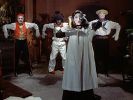Eye For Film >> Movies >> The House In Nightmare Park (1973) Film Review
Mining a similar, if distinctly less bawdy, seam of humour to Carry On Screaming - which I was surprised to discover predates it by seven years - time has not been particularly kind to The House In Nightmare Park.
Although Frankie Howerd's natural ability to flourish his one-liners (ooh, missus), has its moments in this horror spoof, the end result feels curiously flat - with the film not managing to deliver on either the promise of laughs or creepiness. Even leaving aside an episode of 'blacking up' and the presence of 'comedy Indian' Patel (John Bennett) to whom Howerd's instruction to swap headgear with the assertion, "Get your bandage off" is the film's most cringeworth moment, the scripting by TV stalwarts Clive Exton and Terry Nation is patchily wry at best.

Howerd plays Foster Twelvetrees a "tragedian" whose sense of his own ability to act out Dickens' monologues is far in excess of his talent. The promise of five guineas takes him to the sort of house familiar to Hammer audiences of the time - not least because the setting of Oakley Court had already been used in The Reptile and 1963's The Old Dark House among others. It is owned by the oddball Henderson family and their motives for inviting him have less to do with the love of Foster's talent than the fact that he has a connection to the family that could cost them dearly - unless they do something about it.
If you're looking for a double entendre, then Howerd will certainly give you one, but it's not enough make up for the plodding script. Being a spoof, you would expect the story to be a familiar reworking of stock horror ideas, but the narrative feels stale and suffers from trying to mix too many things - mad woman in the attic, snakes in the basement, human marionettes. The presence of American actor Ray Milland as the head of the house, adds to the enjoyment a little but the rest of the cast, including Hugh Burden, Kenneth Griffith and Elizabeth MacLennan, don't leave much of a mark.
The direction from Peter Sykes (who knew the Hammer territory, having made Demons Of The Mind for them in 1972) has its moments - particularly when he makes good use of skewed or twisting camera angles and tracking shots. But the most enjoyable part of the film is undoubtedly the excellent score from Hammer House regular Harry Robertson (billed here as Harry Robinson), he achieves a sense of menace through music even when the visuals are failing to deliver the goods. The film is most likely to appeal to Howerd fans looking for a bit of Seventies nostalgia but anyone else is liable to find it both silly and slight.
Reviewed on: 12 Apr 2013



















